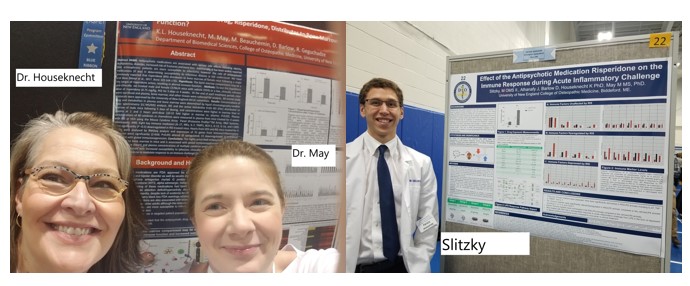
Patients with severe mental illness are more susceptible to infections for a variety of reasons, some associated with the underlying disease and some due to environmental factors including housing insecurity, smoking, and poor access to healthcare. The psychiatric medications, including antipsychotic drugs, used to treat these disorders are known to have complex side effects.
Dr. Karen Houseknecht has been studying the metabolic and endocrine side effects of antipsychotic medications for nearly 20 years. Most recently, she teamed up with Dr. Meghan May to evaluate the effect of antipsychotic drugs on the immune system in order to ask whether a component in the higher rates of infection in patients with severe mental illness could be their antipsychotic medications themselves. The question became critically important during the pandemic, as high levels of within-facility transmission of COVID-19 in inpatient settings has been widely reported. “Our findings from a prior study indicated that the antipsychotic medication risperidone suppresses the immune system of previously healthy mice. What we weren’t sure about was whether the immune system could rebound and respond if it was challenged,” explains May. “Given the rate of antipsychotic use on- and off-label in various settings, we immediately needed this question answered given the high risk of COVID-19.”
Novel findings of the study include: 1.) animals treated with a low clinical dose of risperidone were unable to mount a normal cytokine response to an inflammatory challenge, and 2.) animals treated with low dose risperidone were unable to produce antibodies in response to a pneumonia vaccination.
These alarming results are important for a wide range of patients beyond those with severe mental illness. Antipsychotic medications are widely prescribed off-label for diverse indications to non-psychotic patients including children and older adults, who are also at increased risk for COVID-19 complications and mortality. They are also used to treat delirium in trauma settings such as the emergency room; importantly, severe COVID-19 infection is often associated with delirium. “The risk of administering a medication to treat delirium caused by COVID-19 could have the tragic unintended consequence of suppressing the patient’s immune system when they need it most in order to fight the virus,” said Houseknecht. “Our study strongly suggests that formal evaluation of their use for delirium is warranted.”
Data presented in this paper were generated as part of Matthew Slitzky’s (COM ’22) Morgane Fellowship project. Other UNE authors include Dr. Beau Rostama and Deborah Barlow, Research Technician. This work was supported by a grant from the National Institutes of Health (Houseknecht).
Here is the link to “Antipsychotic-induced immune dysfunction: A consideration for COVID-19 risk”: https://www.sciencedirect.com/science/article/pii/S2666354620300624
